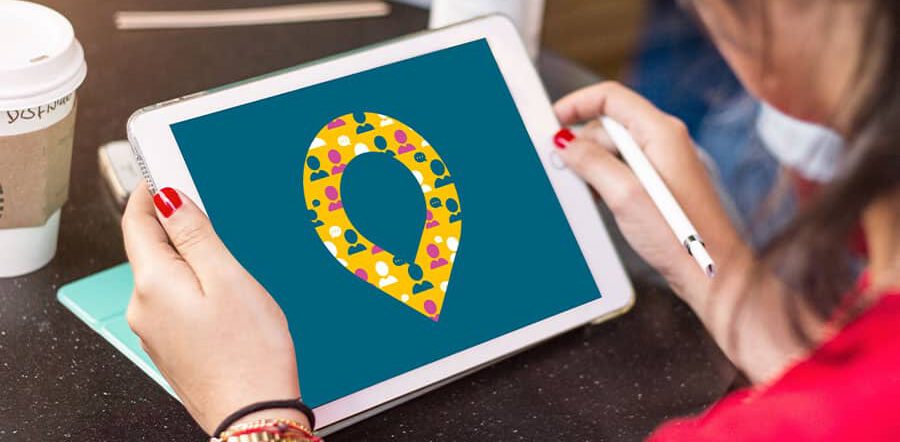Recycling; we all want to do our bit but sometimes it can be a bit confusing understanding what you can (and can’t) recycle.
Here in the UK around 80% of our paper and cardboard is recycled but only about 10% of our plastic waste; so we thought we’d put together a basic guide on what, where & how you should recycle your rubbish.
Recycling guidance is clearer now than it used to be, so it’s worth taking a bit of time to update yourself as there could be some things that you were throwing away, not realising you could have stuck them in the recycle bin!
The on-pack recycling labels are the best place to check initially, they will tell you how to recycle each item and if the packaging is likely to be collected in your domestic recycling bins, or if you will need to take it to your local recycling centre. Click here for more info on recycling in your area.
If the packaging has this symbol it is widely recycled and you can likely put it in your household recycle bin. These are items such as paper, cardboard, junk mail, magazines, newspapers, plastic bottles, aluminium and aerosol cans.
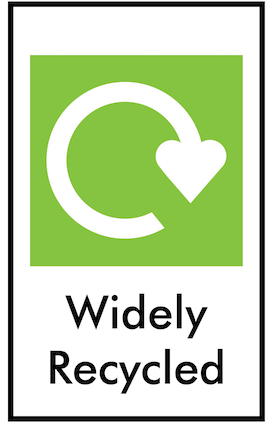
These items need to be rinsed before being placed in your recycle bin, any food residue could contaminate other materials; such as food tins. For hand soap bottles – rinse and recycle bottle but throw the pump away, these can’t be recycled.
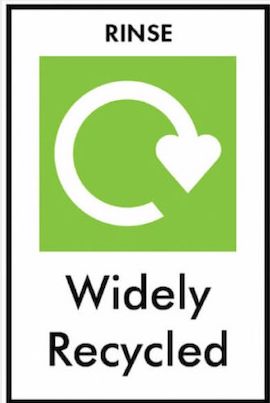
These items are widely recycled, rinse but replace the lid, eg glass jars and plastic milk bottles. For cleaning items and detergents, triggers can remain on, for shampoo/toiletries bottles – rinse and put lids back on if possible.
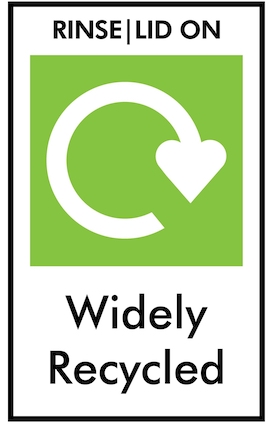
These are items such as soft drinks bottles; flatten and put the lid back on to save space in your recycle bin. Lids under 40mm can only be recycled if they are replaced back on the bottle. Unless specified, leave the labels on bottles as they will be removed in the recycling process.
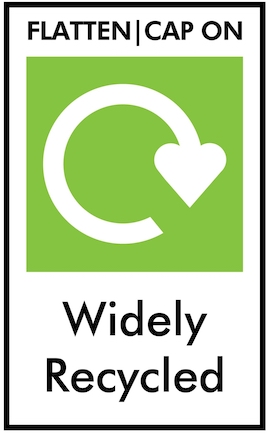
This is packaging such as drinks carton tetra packs, which is recycled in domestic recycle bins by some local authorities, but not all, so it’s best to check here first as this may need to be recycled at a local recycling facility.
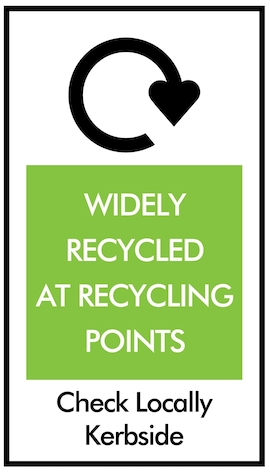
Certain types of soft plastics and films can be recycled at collection points along with supermarket carrier bags; this includes wraps found on newspapers & toilet rolls etc, bread bags, breakfast cereal liners, frozen food bags, bags for loose fruit and vegetables. Just give it a quick clean then scrunch it up tight to test if it is soft plastic, if it pings back it’s a good indicator that it is.
Recycling points for these are usually found at larger stores and trials of these collection points are currently in 30 of our stores.

This can not be recycled.
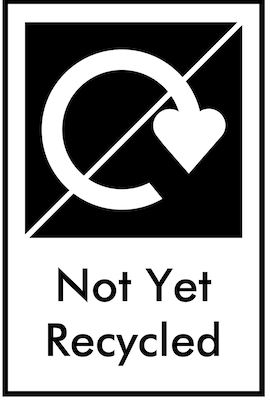
The sleeve on this item is not recyclable. Only recycle these items if you can remove the plastic label, sleeve or film.
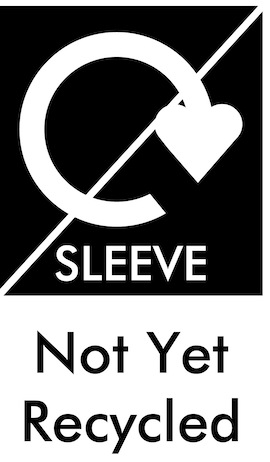
Glass bottles and jars – rinse and put lids back on. Separate glass colours if you are taking to a bottle bank.
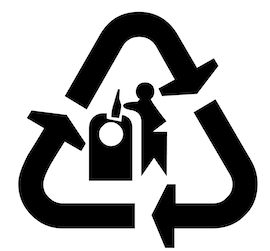
This is recyclable aluminium.
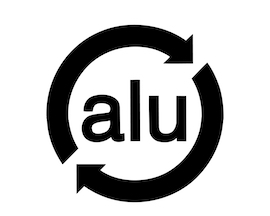
This is compostable – such as our new carrier bags! Should be recycled with garden waste, never place in with other plastics.
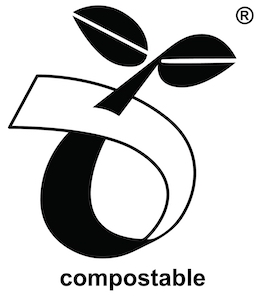
Suitable for home composting.
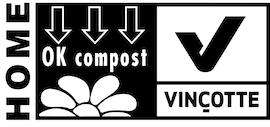
This does not mean that the packaging is recyclable; it signifies that the producer has made a contribution towards the recycling of packaging.
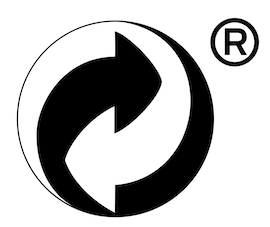
A general symbol which indicates that this item can be recycled.
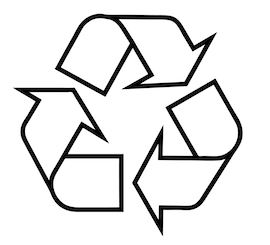
This type of symbol identifies the type of plastic with numbers 1-7. Types 1,2 & 5 can be recycled at home. Type 4 can be taken to local soft plastics collection points. The newer green recycling symbols as shown above are a much easier reference guide and are shown on most household plastic.
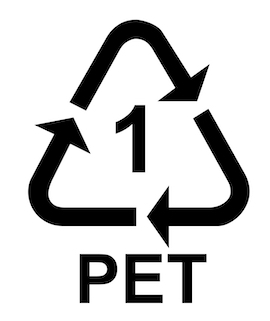
This item has been made using wood from well managed forests.
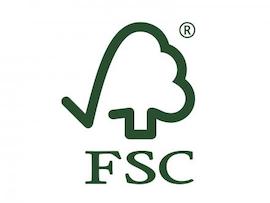
WEEE – Recycle old electrical items
We are pleased to offer our customers the chance to recycle their old electrical items when purchasing a new/replacement item from us. This includes e-cigarettes, fragrance plugins and toys that are battery-operated. Please speak to a colleague for more information.
Batteries
We also accept batteries from electrical and electronic equipment including mobile phones, laptops and power tools. We cannot accept car or other industrial batteries, or batteries with connecting wires through this scheme.
Old electrical equipment marked with a crossed out wheeled bin sign can be recycled. Please don’t throw any electrical equipment (including those marked with this crossed out symbol) in your bin.
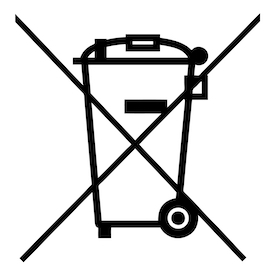
It is really important to check what your local authority accept from your recycle bins; visit www.recyclenow.com/local-recycling for more info on recycling in your area plus there is lots of useful information about what, where and how to recycle.
If you are ever in doubt about whether something can be recycled, always leave it out and put it in your general waste bin.
Recycling is not just about how we dispose of our household waste items, often many other items in our households that are no longer wanted or needed can be recycled or repurposed. Helen Jackson, our Board Ambassador for Climate Action, talks about her passion for sustainability and the ways in which we could all help tackle the climate crisis by looking at things a bit differently. Click here to find out more.


